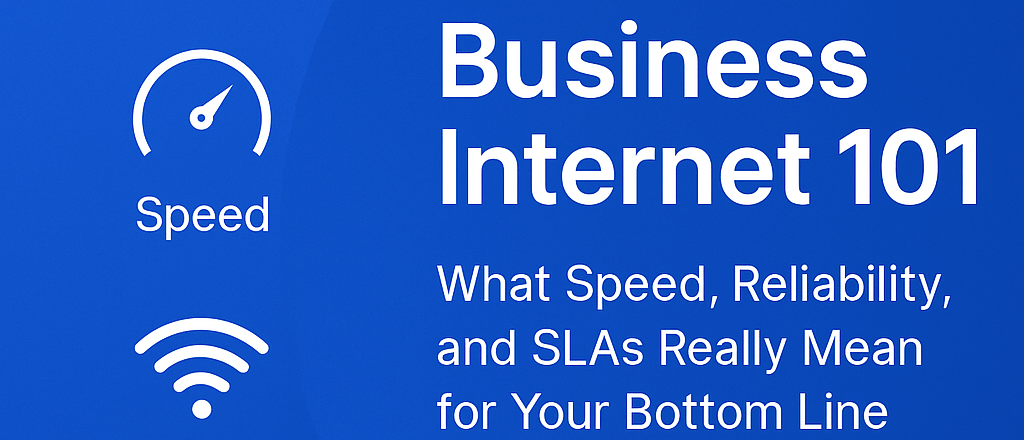Business Internet 101: Why Speed, Reliability, and SLAs Really Matter
Learn how choosing the right business internet—based on speed, uptime, and service-level agreements—can boost productivity, customer satisfaction, and long-term growth.


Business Internet 101: What Speed, Reliability, and SLAs Really Mean for Your Bottom Line
Your internet connection isn’t just a utility—it’s the backbone of your operations.
From cloud phone systems to video conferencing and CRM platforms, every aspect of modern business depends on fast, stable, and secure internet. Yet too many companies still run mission-critical operations on consumer-grade plans or outdated infrastructure.
If your internet plan isn’t built for business, it’s not built for growth.
Here’s what you need to know when choosing or upgrading your business internet connection—and why it matters more than you think.
1. Why Speed Alone Isn’t the Whole Story
Yes, speed is important. But not all speed is created equal.
Download speed is what most providers advertise. But for businesses, upload speed is equally critical—especially if you're running cloud-based tools, VoIP calls, or sending large files.
Also pay attention to symmetrical speed (upload and download are equal) and whether your plan includes bandwidth caps that could throttle performance during peak hours.
2. Uptime and Reliability Directly Impact Revenue
Every minute of downtime costs money. Missed calls. Disrupted sales. Lost trust.
Business-grade internet plans often come with uptime guarantees of 99.9% or higher—backed by Service Level Agreements (SLAs). These SLAs include penalties or refunds if service falls below promised levels, giving you a real safety net.
Compare that to consumer internet, where downtime is “just part of the deal.”
3. What to Look for in a Service-Level Agreement (SLA)
An SLA is your business’s agreement with your provider—and not all SLAs are created equal.
Key things to check:
Uptime guarantees (99.9%+)
Latency thresholds
Response time for outages
Time to restore service
Support availability (24/7 or business hours only)
A strong SLA isn’t a luxury—it’s a requirement if you rely on cloud tools, VoIP, remote workers, or critical online systems.
4. Don’t Forget About Security and Scalability
Business internet plans often include enhanced cybersecurity options: dedicated IPs, firewall configurations, traffic monitoring, and more. These aren’t available with most residential plans.
Also, think ahead. Your provider should offer plans that scale with your team, so you don’t have to switch every time you grow or expand to a new location.
5. When to Upgrade Your Business Internet
Here are common signs it’s time to switch or upgrade:
VoIP calls drop or lag frequently
Video conferencing freezes or buffers
Remote workers complain of access issues
Upload speeds can't keep up with daily needs
Your current provider doesn’t offer an SLA
If any of these sound familiar, it's time to talk to an expert.
Choosing the Right Business Internet Partner
At Elliott System Partners, we help businesses choose the right internet solution based on their current needs and future growth. Whether you’re upgrading, relocating, or just tired of outages, we guide you through every step—from evaluating providers to managing the installation and support.
Need business internet you can count on?
Contact Elliott System Partners to get matched with the right high-performance, SLA-backed solution for your company.


